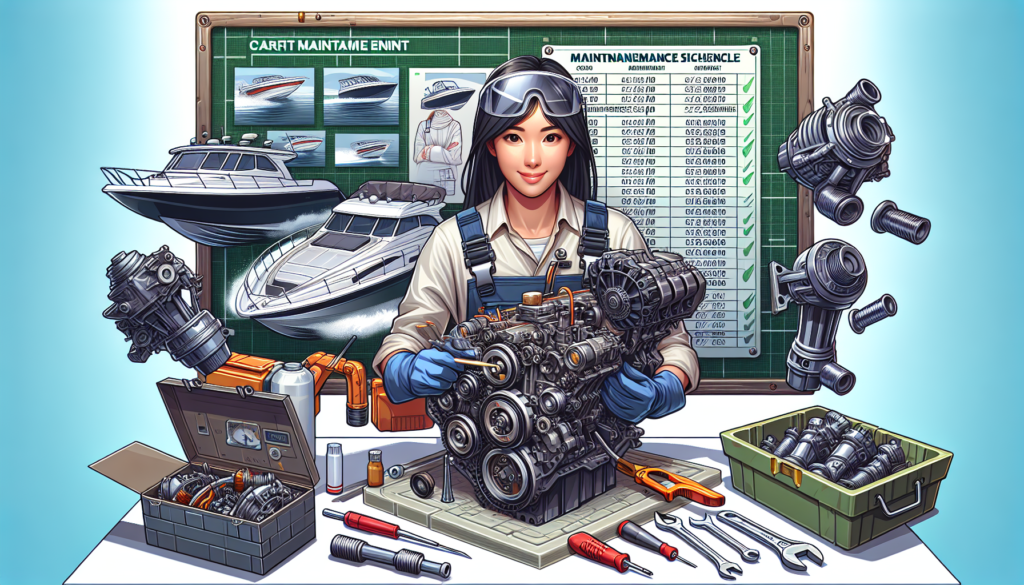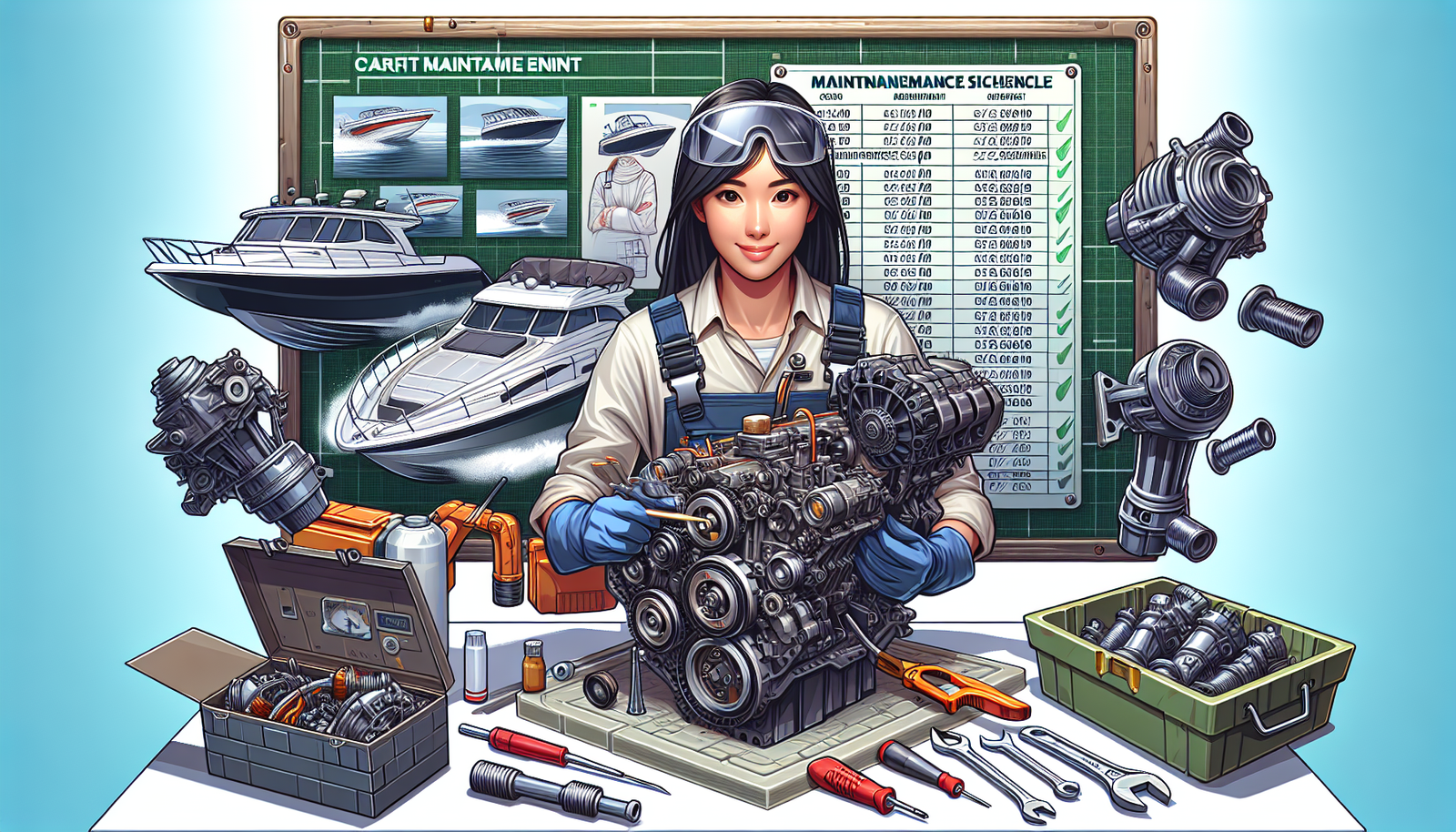Navigating the waves on a beautiful sunny day can be the epitome of enjoyment – but only if your boat’s engine is in prime condition. You’ll find immeasurable value in “The Best Boat Engine Maintenance Schedule for Long-Term Reliability”, as it offers beneficial insights. The guidance extends from top-notch advice on when to change your engine’s oil or replace the spark plugs, to understanding those crucial warning signs that urgently need your attention. This well-researched piece is designed to keep your boat’s engine humming smoothly for years, guaranteeing you many memorable seafaring adventures ahead.

Understanding the Importance of Regular Boat Engine Maintenance
regular boat engine maintenance is really much more than a part of owning a boat; it’s the key to ensuring its safe and reliable usage. Ignoring this important responsibility can lead to disastrous consequences, some of which can be quite expensive to fix.
Recognizing the Role of Regular Checks in Engine Longevity
Regular checks go a long way in ensuring the longevity of your boat engine. By staying on top of your engine’s condition, you’re able to spot early signs of wear and tear that could, if left unattended, result in severe damages. Even minor abnormalities could denote upcoming major problems.
Essentiality of Maintenance for Smooth Operation
Regular boat maintenance isn’t just about ensuring that your engine runs for a long time. It’s also about ensuring that it runs well. Maintenance ensures smooth operation of your boat engine, keeping it at optimal performance levels. You’ll enjoy better fuel economy, efficiency, and overall improved boating experience.
Importance of Preventive Maintenance to Avert Unnecessary Repairs
Preventive maintenance is all about catching red flags before they become emergencies. It helps to avert unnecessary repairs in the future which could end up costing you a significant chunk of money. Not to mention, a well-maintained engine is less likely to fail on you unexpectedly, leaving you stranded on the water.
Establishing a Regular Maintenance Schedule
Having a regular maintenance schedule is crucial in order to ensure the proper functioning of your boat engine. Without a plan, crucial tasks might get missed out, leading to eventual failures.
Frequency of Regular Maintenance
While the exact frequency of maintenance will depend on the type and usage of the boat, there should really be no compromise on regularity. Ideally, aim for at least a thorough check before any major boating season and routine checks after every boating outing.
Benefits of a Planned Schedule
A planned schedule ensures that things aren’t left till the last minute. It allows for adequate time for any repairs or replacements, if necessary, and allows you to be prepared in advance instead of being caught off guard with any sudden malfunctions.
Setting Up a Maintenance Calendar
A maintenance calendar can serve as a helpful reminder for what needs to be checked and when. It might feel like an extra step but in the long run, it can save you time by keeping you organized.
Pre-Season Boat Engine Checkup
Before starting any major boating season, a pre-season checkup should be your priority. This is the time to assess the engine’s condition after prolonged periods of non-use and prepare for the heavy use ahead.
Importance of Pre-Season Inspection
Pre-season inspections are critical in ensuring that the boat engine is ready for the upcoming boating season. A thorough inspection can help identify any problems before they escalate into major issues, ensuring an uninterrupted, enjoyable boating experience.
Essential Checks: Coolant, Oil, and Propeller Inspections
The coolant, oil, and propeller are especially crucial to inspect during a pre-season check. The coolant fluid levels should be adequate, while the oil should be clean and at an appropriate level. Meanwhile, the propeller needs to be physically checked for any visible damages and examined for any unnoticed tuning needs.
Pre-Season Maintenance Tips
Apart from cooling, oil, and propeller inspection, don’t forget to check other essential components. Ensure that the batteries are charged, gas tanks are filled, hoses, belts, and cables are in good condition. Keep an eye out for corrosion, which can become a problem area if left untreated.
Routine Engine Inspection
Aside from pre-season check-ups, routine engine inspections are important throughout the boating season. These inspections allow you to catch any issues early and ensure optimum performance.
Engine Oil Inspection
Engine oil is a vital part of engine performance and longevity. Regular inspections of engine oil can help identify oil leaks, dirty oil that needs to be replaced, or low oil levels that need to be topped up.
Cooling System Check
The cooling system plays a key role in preventing the engine from overheating. Regularly inspecting it ensures that coolant levels are always appropriate, and there are no blockages in the cooling system that can disrupt its performance.
Battery Inspection
Batteries are essential for starting the boat and operating its electrical components. Regular battery inspections are therefore crucial to ensure that they are holding charge and not corroding.
Fuel System Review
Your boat’s fuel system is critical for its operation. Regular examinations of components like the fuel tank, fuel filters, and fuel lines can prevent problems like fuel leaks or degraded fuel quality.
Prop Shaft and Stern Tube Check
Lastly, don’t overlook the prop shaft and stern tube. Monitor them for any sign of damage or unusual movement to ensure your boat continues to move smoothly.
Spark Plug Maintenance and Replacement
Your boat’s spark plug is another component that can cause problems if not properly taken care of. From affecting your boat’s speed to causing issues with starting the boat, a bad spark plug can wreak havoc.
Signs of Spark Plug Wear and Tear
Typical signs of spark plug wear and tear include arcing, electrode erosion, cracked insulator, or heavy carbon deposits. If your boat seems sluggish or having trouble starting, it’s time to inspect the spark plugs.
Steps for Replacing Spark Plugs
Replacing spark plugs can be quite straightforward. First, remove the old spark plug using a spark plug socket. Next, prepare your new spark plug by checking its gap and adjust if needed. Check the spark plug hole for any debris before installing the new plug and tightening it with a torque wrench.
Choosing the Right Spark Plug
Different boat engines require different types of spark plugs. Check your owner’s manual to determine the right spark plug for your particular model.
Maintaining the Fuel System
The fuel system plays a crucial role in the performance of your boat engine. Regular is key in keeping it functioning optimally.
Cleaning the Fuel Tank
Dirt, algae, and water can accumulate in the fuel tank over time, reducing the quality of your fuel and potentially leading to engine damage. You should regularly clean your fuel tank to prevent this.
Maintaining the Fuel Filters
The fuel filter catches contaminants before they can get into the engine. Regular replacement or cleaning of fuel filters is crucial for maintaining the quality of fuel that gets to your engine.
Checking for Fuel Leaks
Fuel leaks are not just dangerous; they can also negatively affect the performance of your boat engine. Regularly checking for leaks can help you spot and address them early.
Fuel Additives and their Benefits
Fuel additives can help improve engine performance and longevity. They can clean, lubricate and protect the fuel system, enhance fuel stability, and even help in improving your boat’s engine power output.
Propeller Maintenance
Your boat’s propeller plays a critical role in how your boat moves. Therefore, regular propeller maintenance is crucial.
Regular Propeller Check Instructions
Regularly check your propeller for dents, cracks, or any other forms of damage. Damaged propellers can cause vibration that can damage the drive train. Make sure the propeller hub is in perfect condition as well.
Dealing with Propeller Damage
Immediate attention should be given to any form of propeller damage. Small dents can often be repaired, but serious damage may require replacing the propeller entirely.
Importance of Shaft Alignment
Shaft alignment plays a key role in maintaining the optimum efficiency of the propeller and avoiding additional stress on the engine. Any misalignment can cause significant mechanical problems.
Propeller Lubrication Tips
Regularly lubricate the prop shaft with an appropriate grease to keep it turning smoothly. Also, apply anti-corrosion spray to the exposed metal parts.
Outboard Motor Maintenance
Typically used in small boats, outboard motors require special attention to stay in top condition.
Flushing the Outboard Motor
Flushing the outboard motor after every use, especially in saltwater, is crucial to prevent the build-up of salt and impurities.
Lubricating the Outboard Motor
The outboard motor requires regular lubrication to prevent corrosion and ensure all moving parts work smoothly. Use a marine-grade grease for best results.
Fuel Stabilizer Usage in Outboard Motors
A fuel stabilizer is a vital component in outboard motor maintenance. It prevents the fuel from deteriorating during storage, which can impact the engine’s performance.
Winterizing Your Boat Engine
Winterizing your boat engine is crucial in regions where the boat won’t be in use during the cold months.
Why Winterization is Crucial
Winterizing protects your boat engine from freezing temperatures, as the water left in the engine or cooling system can freeze, expand, and even crack the engine block or manifold.
Winterization Steps: Draining, Cleaning, and Covering
Winterization involves several steps, including draining leftover water from the engine and cooling system, cleaning the engine, and covering it to protect it from the harsh weather.
Essential Tools and Products for Winterization
Having the right tools makes the winterization process easier. These may include basic hand tools, antifreeze, engine oil, fogging oil, fuel stabilizer, grease, and wax.
Dealing with Common Engine Problems
Despite regular maintenance, boat engines might sometimes encounter problems that need to be addressed immediately.
Overheating Issues
Overheating is a common problem and can be caused by low coolant levels, a clogged cooling system, or damaged water pump. If you notice your engine overheating, seek troubleshooting assistance promptly.
Troubleshooting Engine Starting Problems
Problems with starting the engine are often linked to fuel or battery issues. If your boat engine refuses to start or struggles, ensure the battery is fully charged and the fuel system is not blocked.
Dealing with Oil Pressure Problems
Low oil pressure is a serious concern as it could lead to damaging the engine. Always investigate the cause of any oil pressure warnings and remedy the situation as needed.
Addressing Failure of the Charging System
A failing charging system could mean your boat battery isn’t getting properly charged, which could lead to starting issues and impaired electrical functions. Regular inspection of the alternator and wiring is crucial to avoiding any charging system failures.
In conclusion, maintaining your boat engine might seem like a daunting task, but the benefits far outweigh the effort. A well-maintained boat offers great peace of mind, knowing that you can count on smooth performance whenever you head out for your boating excursion.

